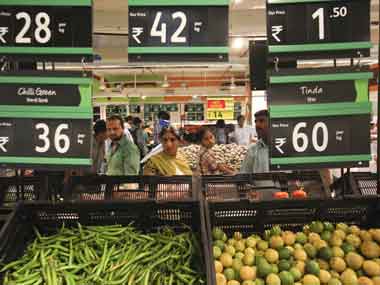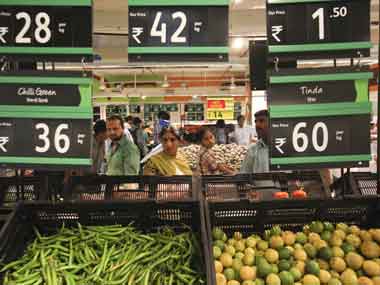After years of dithering, the government finally eased up on foreign investment rules in India’s booming retail sector.
On late Thursday evening, the government announced that it would allow 51 percent foreign direct investment (FDI) in the multi-brand retail segment and raise the cap on foreign investment in single-brand retailing to 100 percent from 51 percent.
Multi-brand retail companies are those that sell a variety of products under different brands, like supermarket and chain store operators. Examples of such companies include Wal-Mart and France’s Carrefour.Single-brand retail are companies that sell products under one brand, such as Nike or Levi’s.
[caption id=“attachment_139928” align=“alignleft” width=“380” caption=“Awaiting foreign brands. Reuters”]
 [/caption]
[/caption]
As expected, the announcement cheered the organised retail industry; various company officials had been urging the government for a long time to liberalise investment norms in the sector.
India’s retail market is worth an estimated $450 billion, with more than 90 percent accounted for by millions of mom-and-pop (kirana) stores. Organised retail makes up about 5-10 percent of the market.
So who gains?
The biggest gainers will, obviously, be local organised retail players as well as multinationals who’ve been eyeing a foothold in this market for a long while now.
Not surprisingly, in the equity markets, retail stocks-Pantaloons Retail, Shoppers Stop and Koutons Retail-ended between 6 percent and 12 percent higher at the end of trading yesterday, as expectations mounted that the FDI proposal would be approved.
Impact Shorts
More ShortsThe easing of FDI norms will come a big relief to these companies because the fact is that most of them are actually struggling with different financial problems and will be more than happy to ink a deal with a partner who can bring in some badly-needed cash.
For instance, the Future group, one of India’s bigger organised retail players and owner of the Big Bazaar chain of outlets, has debt of about Rs 4,300 crore, according to The Economic Times , and is scrambling for ways to reduce that debt.
Tie-ups will help improve investments in infrastructure, especially cold storage facilities, according to analysts quoted by _Business Standard._In fact, these arrangements could also contribute to lower food inflation in a country in which up to 40 percent of fresh produce is wasted because of poor storage systems.
The decision to allow FDI in multi-brand retail is expected to be announced formally in Parliament today, and is expected to include riders such as a minimum investment of $100 million to start retail operations in the country; 50 percent of that will have to be invested in back-end operations such as food-processing units and warehouses and supply chains as well.
There could also be restrictions on where retailers can open stores - companies may only be allowed to open stores in cities with a population of more than one million.
According to experts, none of these present any significant hurdle for international retailers, who, struggling with saturating developed markets, are on the hunt for higher growth in emerging markets such as India, China, Russia and Brazil.
More choices for consumers
Multi-national companies such as Wal-Mart, Carrefour, Metro and Tesco are already present in India, but only in wholesale operations. That means they can only sell to bulk buyers such as hotels and other retailers.
Don’t expect them to come sprinting into the retail segment in a hurry. Most experts believe that it could take up to 12 months before a foreign retail giant actually opens an outlet in the Indian market, given the investments needed in the supply chain.
Plus, as The Economic Times notes, “retail trade” is a state subject , which means all regulatory approvals and clearances have to be provided by state governments. Not all of them will be in a mood to oblige, considering there is still stiff political opposition to 100 percent FDI.
Of course, there will also be the usual cries of “foreigners will take away market share-and jobs-from Indian companies”. That opposition might delay some plans for foreign companies.
The question to ask here is, will the traditional mom-and-pop stores wither away in the face of competition? The chances are unlikely, because, at the end of the day, those that evolve with the changing market will survive.
In addition, it still remains to be seen whether Indians will actually shop at Wal-Mart and desert their local around-the-corner stores, which offer facilities of home deliveries and extended credit periods to regular customers.
As Firstpost pointed out on Thursday, we really shouldn’t worry too much about the kirana shops. “They are good enough to take care of themselves. Just allow investments to come in - they would in all probability make neighbourhood shops still smarter and more efficient,” the article noted.
So, hello Wal-Mart, Carrefour. Bring it on.
)